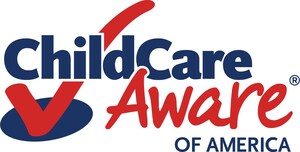New Report Shows Nonstandard Hours of Work Cause More Obstacles for Families and Children
Working Parents Need More Than "Day" Care
WASHINGTON, Jan. 24, 2019 /PRNewswire/ -- Today, Child Care Aware® of America (CCAoA) released its Nonstandard Hours (NSH) Paper: "It's About Time! Parents Who Work Nonstandard Hours Face Child Care Challenges," which found that the inadequate supply of NSH child care is problematic and raises concerns about access to safe, affordable, and quality child care for many families in our country. In today's economy, where anyone can work 24/7, many parents struggle to find reliable, affordable NSH child care. NSH is defined as hours worked outside the traditional Monday through Friday work week. By 2020, occupations requiring nonstandard schedules are projected to see the most employment growth.
In the 2014 Survey of Income and Program Participation, 43 percent of all children under 18 in the United States have at least one parent who works NSH. This translates to about 31 million children who may need NSH care. Child care during nonstandard working hours is extremely limited when available and often, unlicensed.
With a declining child care provider market, it's even harder to find NSH care. Many parents turn to a collection of center-based child care, home-based child care, and child care provided by family, friends, and neighbors. Lack of access to a consistent caregiver puts a strain on both parents and children in a number of ways and this report highlights that.
Report Highlights
- Our Mapping the Gap™ efforts with the state of Massachusetts. We focused on NSH — specifically, the current supply of child care providers around the sites of two proposed casinos and one existing casino.
- Factors that affect the likelihood of needing NSH care including poverty, lack of paid leave, and irregular work schedules.
- More than one in four Americans with low incomes work a nonstandard hours job.
- Few states have regulations focused on NSH of care, especially for family child care. Realistic regulations for care during NSH could help to further expand licensed care.
CCAoA works with state Child Care Resource and Referral (CCR&R) agencies to track the cost of care for children by age and setting, then compares each state's costs to its median income, ranking the states by affordability for each category of care. CCAoA's interactive map shows the relationship between costs and median income by state. The organization has also partnered with the Economic Policy Institute (EPI) to add this year's data to an online interactive calculator of child care expenses by area.
Congress recently justified the more than $2.3 billion increase to the Child Care Development Block Grant (CCDBG) saying, "...the department should work with states to ensure they are meeting the needs of families with nontraditional work hours." However, more research needs to be done to determine the best practices for programs operating during nights and weekends in order to determine what those standards need to look like.
States, communities and businesses are implementing innovative solutions to meet the NSH child care needs of their employees and of military families. Located in 47 states with touch points at the local, state and national levels, CCR&Rs are a vital resource for families, child care professionals, businesses and community stakeholders. CCR&Rs can connect families to child care providers offering care during evenings and weekends, and can be instrumental in recruiting, retaining and providing outreach to qualified providers to build the supply of NSH care in their communities.
To read and download 2018's The US and the High Cost of Child Care and supplemental interactive map and fact sheets, click here.
To learn more about CCAoA's advocacy efforts visit childcareworks.org. And you can follow the movement for child care on Twitter, Instagram and Facebook using @ChildCareWorks.
About Child Care Aware® of America
Child Care Aware® of America is our nation's leading voice for child care. CCAoA works with state and local Child Care Resource and Referral agencies (CCR&Rs) and other community partners to ensure that all families have access to quality, affordable child care. CCAoA leads projects that increase the quality and availability of child care, offer comprehensive training to child care professionals, undertake research, and advocate for child care policies that improve the lives of children and families. To learn more, visit usa.childcareaware.org. Follow them on Twitter @USAChildCare and on Facebook at facebook.com/usachildcare.
SOURCE Child Care Aware of America
Related Links
WANT YOUR COMPANY'S NEWS FEATURED ON PRNEWSWIRE.COM?
Newsrooms &
Influencers
Digital Media
Outlets
Journalists
Opted In




Share this article